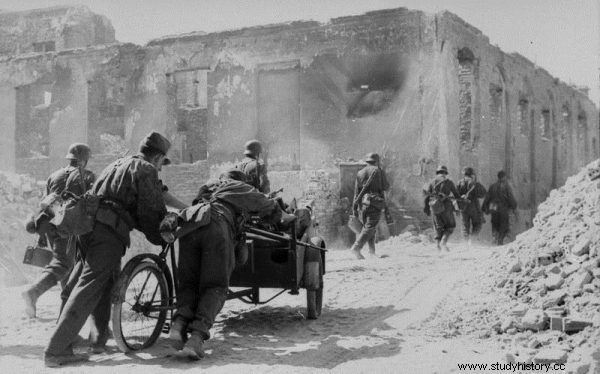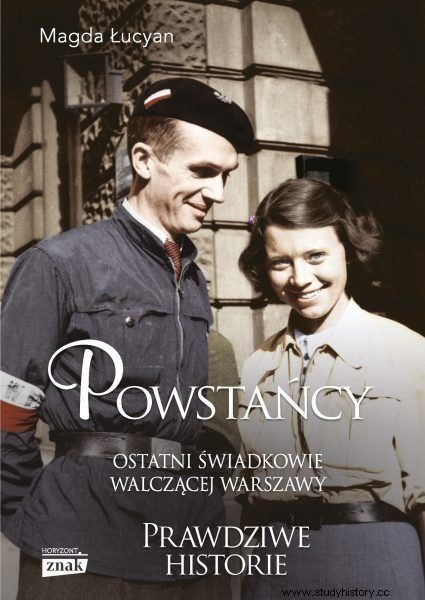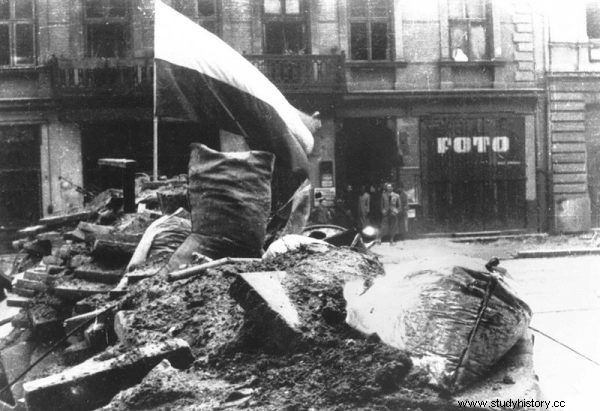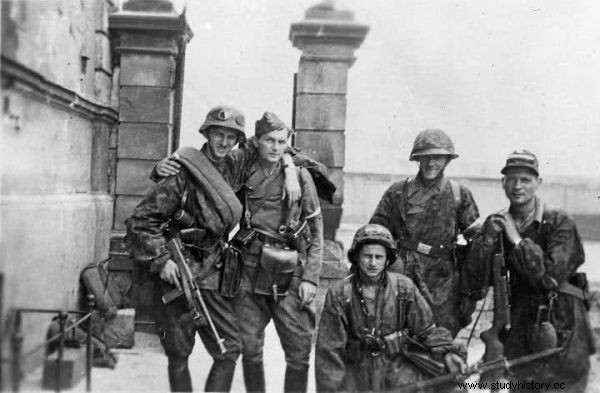If on July 31, 1944 someone told General Bor-Komorowski that the fight for Warsaw would last as long as sixty-three days and would end with surrender, he would probably have tapped his forehead. The Home Army command did not take such a scenario into account at all. So what was it really hoping for?
In the last days of July 1944 in Warsaw you could feel the tension - and a breath of new hope. Jan Nowak-Jeziorański, who was just returning to the capital after an eight-month break, noticed a change in the atmosphere already on the train from Krakow. As he said:
The people talk about nothing but the approaching front, the escape of civilian Germans, the retreat . There is a mood of excitement (…). One feels in the air not only the proximity of the front, but also the anticipation of the impending breakthrough.
"The people were seized with indescribable joy at the sight of the Germans escaping in disorder," the Commander-in-Chief of the Home Army, General Tadeusz Bór-Komorowski, later confirmed this account. "The population began to feel confident that these are the last days of German rule in the capital." He recalled that even the watchman in his house persuaded him that "They take the skin". And he asked:"Are we going to let them dry without settling the bill? Why on earth did we have a volume of underground organization for four years? ”.
"Faith and certainty of victory were unwavering"
Indeed, the events of July seemed to confirm the thesis of the inevitable collapse of Germany. News of the Red Army's victories came from the east. The front was quickly approaching the capital, and the attack on Hitler, prepared by Colonel Claus von Stauffenberg, convinced everyone that discontent was also growing among the Germans. People began to believe that it was possible to repeat the scenario from the fall of 1918, when the Reich was plunged into complete chaos.

The AK leaders did not think that the Germans would put up any strong resistance.
No wonder that the leaders of the Polish Underground State who stayed in the country also believed that the strategic situation was favorable to them. The uprising, which had been discussed for over a year, began to take shape. General Bór-Komorowski, his deputy, General Leopold Okulicki, and the Chief of Staff of the Home Army, General Tadeusz Pełczyński, were actually sure of a victory and were only considering choosing the right moment to enter the action. "They expected the fight for Warsaw to be short and relatively easy," reports historian Jan M. Ciechanowski.
The moods prevailing in the staff were presented in a letter from April 1965 by Colonel Janusz Bokszczanin, in mid-1944 acting as the Deputy Chief of Staff for operational matters. He wrote:
Faith and certainty of victory were unshakable (...) and the slightest doubts as to whether reservations were qualified as meanness and defeatism ... she was not even told, considering her a win in advance - at most a few isolated, maybe more serious clashes, followed by disarming the terrorized Germans .
Bokszczanin explains that in fact ... the fight at all "was not foreseen". At least in this regard, the Home Army commanders had no illusions. They realized that the condition of their weapons was terrible. "Our supplies of ammunition and food could only last for seven to ten days," recalled Bór-Komorowski years later. Others assessed the preparation of the insurgents even worse. But it wasn't important. As Bokszczanin emphasizes:
Only counted successfully. Failure was not taken into account, and there were no predictions in the event of a loss or delay in the fight. There was hope for a quick Soviet victory and help from the West… Certain difficulties and more effort were expected in the event of a premature uprising, but no greater importance was attached to it, as in any case victory was certain.

Three-day linen supply
So what were the specific forecasts? The Government Delegate for Poland, Jan Stanisław Jankowski, announced to one of his associates that the duration of the operation was estimated "within a few days". Therefore, he recommended that the civil authorities should not take part in the uprising.
The same opinions prevailed in the Home Army Commandant. "The commander of the Home Army was convinced that the Russians would enter Warsaw on the second, third, and at the latest seventh day of the fight "- Ciechanowski emphasizes -" Gen. Pełczyński was of a similar opinion; he believed that the fight would be short, it would last a few days, or at least no longer than a week. ”
In line with these predictions were the orders that reached the rank and file of the uprising. Magda Łucyan, author of the book "Insurgents. The last witnesses of fighting Warsaw ” writes that "the vast majority of them were convinced that the Uprising would last several days". One of her interlocutors, Anna Jakubowska, pseudonym "Paulinka", recalls:"Even before August, when we were getting ready, we were told that the Uprising could last up to three days. Even! We were supposed to prepare ourselves enough… ”. Among other things, the fighters were ordered to take with them a three-day supply of underwear.
The "ordinary" insurgents, however, most likely did not know that the optimistic diagnoses of their command were based on one big unknown. "The greatest difficulty lay in the inability to coordinate actions with the Soviet command," General Bór-Komorowski said many years later. Meanwhile, as Norman Davies explains:
The underground leaders (...) could not count on being able to crush the Wehrmacht without anyone's help. The most they could hope for was they would capture the city, or at least a large part of it, and then hold out long enough to wait for other decisive events. They estimated that five to seven days was enough .

photo:public domain The insurgents were to prepare for about three days of fighting.
By this time the prime minister should have managed to conclude a deal with Stalin in Moscow. Western powers will drop weapons and maybe even provide reinforcements. The underground authorities will come out of hiding and establish their own administration. And the Red Army will find itself in a position where it will be able to launch its final attack and remove the Germans from the scene.
"We'll beat the Szkop and I'll be back soon ..."
The possibility that the Russians might not enter the capital in a few days was not taken into account at all. Only one higher officer of the Home Army - the aforementioned Colonel Bokszczanin - accepted such an eventuality. He even warned that the Red Army might deliberately halt its offensive if it realized that supporters of the London government were behind the uprising. He advised to go into battle only when the German-Russian battle for Warsaw was already underway. In vain.
In the end, it was the Bokszczanin who was right in history. The other generals turned out to be too much optimistic. "If Bór-Komorowski and his staff had made a more in-depth assessment of the strategic location, they would certainly have given up trying to capture Warsaw in the first days of August 1944," Ciechanowski concludes.
Especially that Jan Nowak-Jeziorański also warned the leaders against making hasty decisions, who discovered during his stay in London that hopes for help from the West are - unfortunately - in vain. However, it should be remembered that the enthusiasm of the generals was shared by the whole crowd of insurgents.
"Honey, I am really very happy" - said Halina Wiśniewska's husband when he heard about the birth of their son. It happened exactly on August 1, 1944. “But you understand, I have to go to the Uprising. However, you have nothing to worry about. It will take two or three days at the most. We will beat the Szkopów and I will come back to you soon, ”he argued. Wanda Traczyk-Stawska, pseudonym "Pączek", one of the heroes of Magda Łucyan's book "Powstańcy" , thought similarly. - " was convinced that she would come back to them soon, that she would leave them for a maximum of three days ”.

Most of the underground activists welcomed the prospect of fighting with enthusiasm. In the photo, soldiers from the Kedyw College "A".
If we add to this the proliferation of rumors about attempts to provoke an uprising by the communist forces, who had just established the Polish Committee of National Liberation, it is no wonder that the commanders of the Home Army had the impression that they were losing control over the course of events.
"Imagine (...) a man who for five years rushes to a jump over some wall, runs faster and faster, and one step ahead of the obstacle is given the command:stop!" - the Government Delegate for Poland told Nowak-Jeziorański. “He has already accelerated so much that he cannot stop. If it doesn't jump, it will crash against the wall. That's what it is with us. ”
The problem is that it was not taken into account that the jump could also end in a catastrophe. And it seems that the commanders have not been able to believe it for a long time. On August 6, 1944, Colonel Antoni Chruściel "Monter" told his people:" The advantage is no longer on the side of the Germans. Thanks to the victories of our allies and their allies, Germany is sliding towards the abyss. " . And general Bór-Komorowski at the beginning of September kept asking the Commander-in-Chief if there was a chance that the war would end in a few days ...
Check where to buy "Insurgents. The last witnesses of fighting Warsaw ":
